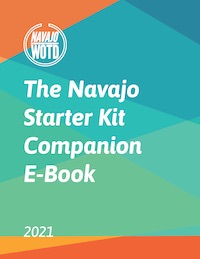Yá'át'ééh! Dííjį́ yéego hózhǫ́ dooleeł!
Hello and have a great day!
Hello! Do your best to make today great!
In Navajo, yá’át’ééh is a greeting, but before it became widespread, it was used to mean “it is good”. The full impact of the word comes from yá-, or the skyward direction.
Yéego (yégoh, yéígo) means “with much effort” or “with greater intensity”.
Dooleeł means “it will be” or “make it so” or “it will be made so”. Many times, speakers will use ‘doo’ (dohh) as a shorter way to say it. This can be confusing if the speaker uses a negation, like “doo yá’át’ééh da doo”.
Put it together, and you have “Hello! Have a great day!”, or as close as you can come to it in the literal sense. Culturally, it’s better to remind people that they have control in keeping a good balance in outlook – or hózhǫ́. ‘Wishing’ someone luck or goodness, in the way English intends to, doesn’t quite keep the same sentiment in Navajo since you’d be saying something like “If only you had luck/goodness.”
This is an example that demonstrates how Navajo can sound direct, and possibly offensive, when it is translated directly into English. Hopefully, you’ll have more questions about what Navajo words imply. Feel free to ask!
Original post date: .
